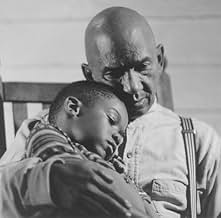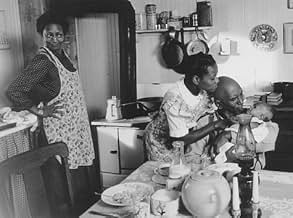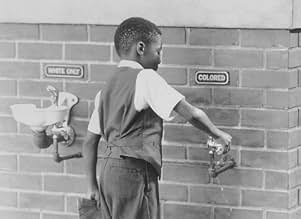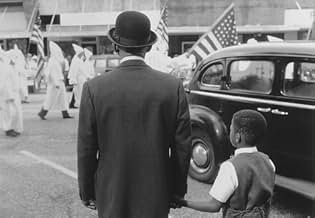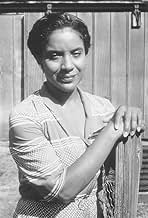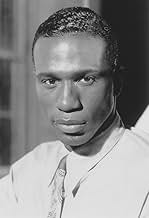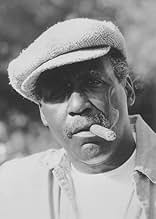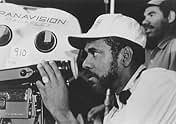अपनी भाषा में प्लॉट जोड़ेंA narrator tells the story of his childhood years in a tightly knit Afro-American community in the deep south under racial segregation.A narrator tells the story of his childhood years in a tightly knit Afro-American community in the deep south under racial segregation.A narrator tells the story of his childhood years in a tightly knit Afro-American community in the deep south under racial segregation.
- पुरस्कार
- 3 जीत और कुल 2 नामांकन
Salli Richardson-Whitfield
- Miss Alice
- (as Salli Richardson)
Ray J
- Cliff (12 Yrs.)
- (as Willis Norwood Jr.)
Frank Hoyt Taylor
- Straw Boss
- (as Frank Taylor)
फ़ीचर्ड समीक्षाएं
I kept waiting for the bad moments to happen, as so often they do in these reminiscent movies of growing up in the south, yet no real drama occurred. These were moments pieced together, and if that was the intent--it worked. True, a child's reflection of childhood would be pieces of memory chained loosely together, impressions of events, people, and times. However, when the movie ended I thought, "That's it?" There were fine performances; however, the plot seemed to soft-step around the real issues, such as the Jim Crow laws, segregated schooling, subservient wages, and escaping to the north to avoid the subjugation. We got breadth, when depth might have made a much more interesting plot line.
The author's stated intention was to show the family that nourished him and protected him from the world of hatred and segregation. The film showed just enough of the segregated life to let the viewer know that Cliff needed to be protected from that world and nurtured to overcome the scars that outside world could inflict. I think Taulbert and the movie did a good job of showing how the love of his immediate and extended family could compensate in some way for the hatred and oppression of the outside world. I hate to see the movie berated for not being a documentary of all the hateful excesses of the segregated South when that was not the movie's intent. We have films that are considered classics that are about different parts of World War II, and they don't document all the atrocities of the Holocaust. Not focusing on parts of an era that are not the main point of the film is not "sugarcoating." It's an excellent film about growing up in a loving family and overcoming challenges through the love and support of others. It's fine the way it is.
"Once Upon a Time When We Were Colored" (1996): Set in the deep American South, over the years 1946-1962, and told as biography, this is the story of one boy's memories of being raised in the Cotton & Bible Belt. He's poor, his family is in pieces, he's Black, he's surrounded by the KKK
and yet, this is a soft, even soft-focus look back at the people who DID provide community family, did not dwell on their poverty nor make their race the focal point of a normal day. We are so accustomed to angry, relentlessly violent films about the racial divides, this film could easily be taken as a Hallmark Card presentation
but SOMETHING about it tells me otherwise. Yes, problems are depicted, and yes, the times they were a-changin', but not as fast or dramatically as we've come to accept from the quick flip of a few pages in history class. I LIKE the pace of this film. It's slow, warm, often funny, occasionally sugary, sometimes sad or maddening, but for the most part it's a nostalgic look back at the GOOD parts of black author's childhood.
It just touchdown little things that happened in the era didn't really stick to any things. And when it came to the very ending they could have delved into that a little more but they didn't. One thing that irritates me the most is that the lead character has a pretty terrible mother and it wasn't acknowledged in any way if this is a true story I wonder how he feels about the end result which sadly he probably like because it was an All-Star cast
Tim Reid has not been that guy from WKRP' for some time now. And no, he wasn't Isaac on The Love Boat either. He still finds himself in too many schlocky TV movies, and weak situation comedies. One must pay the rent, and no one can argue with that.
More and more a champion of black film, he has been careful, deliberate in his choice of projects. Once Upon a Time When We Were Colored, elevates him, appropriately, as a serious filmmaker, black, white, or otherwise.
This is not a new' film, but it is a different approach. An insightful look into Afro-American existence during turbulent times, the focus is on the community, rather than the oppression, the individuals rather than the cause. The result is every bit as effective in getting the message across. You get more flies with honey '
Al Freeman Jr. gets a well-deserved opportunity to show that he's not just some kind of TV Morgan Freeman. His portrayal of Poppa, the family patriarch is wonderful and slighted unfortunately by the Academy. Even the Image awards overlooked him, preferring to bestow honor on the over-cooked and under-talented Phylicia Rashad, one of the only weak links in this strong cast. Bernie Casey and Richard Roundtree both play well against their macho-type.
Don't expect to be hit over the head with the ideas of this film. Just let it ease you on down the road, and, take a look around, every so often as you do.
More and more a champion of black film, he has been careful, deliberate in his choice of projects. Once Upon a Time When We Were Colored, elevates him, appropriately, as a serious filmmaker, black, white, or otherwise.
This is not a new' film, but it is a different approach. An insightful look into Afro-American existence during turbulent times, the focus is on the community, rather than the oppression, the individuals rather than the cause. The result is every bit as effective in getting the message across. You get more flies with honey '
Al Freeman Jr. gets a well-deserved opportunity to show that he's not just some kind of TV Morgan Freeman. His portrayal of Poppa, the family patriarch is wonderful and slighted unfortunately by the Academy. Even the Image awards overlooked him, preferring to bestow honor on the over-cooked and under-talented Phylicia Rashad, one of the only weak links in this strong cast. Bernie Casey and Richard Roundtree both play well against their macho-type.
Don't expect to be hit over the head with the ideas of this film. Just let it ease you on down the road, and, take a look around, every so often as you do.
क्या आपको पता है
- ट्रिवियाWhen Melvin tells the group of elders all the benefits of living up North, he says that Colored men even drive buses. Preacher Hurn replies "Shut yo' mouth!" Isaac Hayes wrote the theme to Shaft (1971), and Richard Roundtree played the titular character.
- साउंडट्रैकMaybe Tomorrow
Written and Performed by Lionel Cole
टॉप पसंद
रेटिंग देने के लिए साइन-इन करें और वैयक्तिकृत सुझावों के लिए वॉचलिस्ट करें
- How long is Once Upon a Time... When We Were Colored?Alexa द्वारा संचालित
विवरण
बॉक्स ऑफ़िस
- US और कनाडा में सकल
- $22,91,255
- US और कनाडा में पहले सप्ताह में कुल कमाई
- $75,675
- 28 जन॰ 1996
- दुनिया भर में सकल
- $22,91,255
इस पेज में योगदान दें
किसी बदलाव का सुझाव दें या अनुपलब्ध कॉन्टेंट जोड़ें

टॉप गैप
By what name was Once Upon a Time... When We Were Colored (1995) officially released in Canada in English?
जवाब

